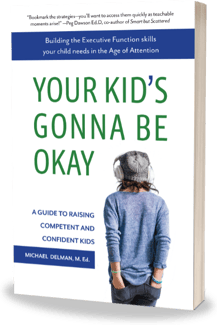Online courses can be a wonderful way to learn almost anything— from accounting to zoology. It can help to fill skill gaps, earn credits toward a degree, and contribute to personal enrichment. Many options are low-cost or even free and there is no commute! So, everyone should sign up for online classes, right?
from accounting to zoology. It can help to fill skill gaps, earn credits toward a degree, and contribute to personal enrichment. Many options are low-cost or even free and there is no commute! So, everyone should sign up for online classes, right?
Hold on - first consider some of the possible pitfalls before you click to enroll.
For many students, all they think they need is a computer and reliable access to the internet to be successful in an online course. In fact, my experience from teaching online for more than a decade is that some students think online courses will be easier than learning in a traditional classroom—that is, they will spend less time and exert less effort. But for most students, and especially for learners with Executive Function challenges, online learning actually requires extra bandwidth, in terms of the array of skills they need to be successful in this environment.
Ideally, before students enroll, they should be able to identify why an online format is a good fit for what they want to learn. Additionally, there should be some consideration for the skills needed to be a successful online student. I’ve outlined a framework below to help learners make an informed choice about online course options.
Interaction
Most online learning options are asynchronous, which means students can log on anytime to read materials and complete assessments. Discussion boards and blogs can be useful to simulate classroom participation, but the dynamic is different as these conversations are not in real time. Synchronous courses require you to log on at a specific time, though these are less common.
Questions to consider about interaction in online courses
- Is the online course asynchronous or synchronous?
- Does the student thrive on the real time, face-to-face connections of a classroom and would the student miss that?
- Does face-to-face interaction overwhelm the student (e.g., an introvert or someone who appreciates time to process information and then respond)?
- How will learning be assessed? During a quiz or test in an online course, usually there is no instructor available to clarify a confusing question. How might the student cope with this?
Time
Classroom learning has set beginning and end times. Teachers and peers notice absences, late arrivals, and early departures. These subtle social pressures help students stay motivated to attend class, be on time, and remain in class for the entire session.
In an online course, typically students set their own schedules for when and how to engage with the material, so time management is critical. For non-credit courses, hours required per week for success can vary. For college-level credit-based courses, a simple calculation can help determine how much time a student will need: Multiply the number of credits by 3. This is the low end of hours per week students should expect to spend on a course. Then multiply the number of credits by 4; this is the high end. So for a 3-credit course, 9 to 12 hours a week is what you need to spend for engaged learning. This calculation applies to standard 14/15-week semesters, so if it’s a 7-week summer session, consider doubling that time.
This estimate may be a bit high for some courses, but it’s better to set aside more time rather than be caught short, especially if the student is new to online learning or a beginner in the subject area.
Questions to consider about timing in online classes
- Does the student like defined start and stop times?
- Does the student have the capacity to self-impose start and stop times and be accountable for them?
- Does the student have the time to commit to an online class?
- How well can the student manage their time to complete required readings and complete course tasks by deadlines?
Writing demands
Many online courses are writing intensive. Discussion boards and blogs are often used in the absence of real-time classroom interaction. For students with Executive Function challenges, writing can be very difficult because it relies heavily on multiple skills: consider how sustained attention, planning and prioritizing, and organization are needed for writing steps such as an outline, draft, revision, and citations.
Questions to consider about writing demands in online classes
- How much support does the student need for Executive Function skills required for writing?
- Is there writing help available that a student would easily access? Will the available writing help be sufficient?
Self-advocacy
An online course in many ways is a directed study. Students are given materials, access to the instructor’s expertise, and assessments. The instructor cannot read the expression of confusion on a student’s face as a new concept is introduced. It’s really up to each individual to evaluate their own progress and know when to reach out to the instructor. Some instructors hold virtual office hours, where they are available to chat online every week at a set time. Others will respond to questions via email, text, or phone.
Questions to consider about self-advocacy in online classes
- How well can the student evaluate when they need help to support learning?
- How comfortable is the student asking for help?
- Will the student be able to get the feedback needed to learn effectively?
Technology
Online courses generally run on a platform—a Learning Management System (LMS). In higher education, the common ones are Blackboard, Moodle, and Canvas. Most of these have online orientations to help new users understand how to access the course, navigate content, submit assessments, view feedback, etc. Students may need Microsoft Office (at least Word), Adobe, or other applications, so be sure to check course requirements.
Other online learning environments such as Lynda.com, Khan Academy, Coursera, and edX are straightforward and contain easy-to-load videos and/or PowerPoint slides.
Questions to consider about technology used in online classes
- What platform will an online course use?
- Does the student have time to learn a new platform before the course begins?
- How quickly does the student adapt to new technology?
- Do they know how to access technology help?
In summary, online courses may be a great fit for some learners, and not a fit at all for others. What’s important is to find out if there’s a mismatch between a student’s current Executive Function skill set and the array of demands the online class presents. When there is a skill gap, online Executive Function coaching can be an effective way to develop those abilities to help students and adults become successful online learners.
Photo by JESHOOTS.COM on Unsplash
 Wendy Gordon-Hewick, M.A., is an Executive Function coach at Beyond BookSmart and an adjunct faculty member at North Shore Community College. She has been teaching online since 2007. Additionally, she currently works as the Care Team Case Manager at Brandeis University, and for ten years prior worked in specialized advising programs assisting at-risk undergraduates to persist in their studies through graduation. After earning her bachelor’s degree in Psychology at Arcadia University in Pennsylvania, she completed a master’s degree in Applied Child Development and Clinical/Developmental Psychology at Tufts University and a post-graduate seminar in Mood Disorders at Harvard University. She enjoys helping students develop strategic approaches that align with how they define success.
Wendy Gordon-Hewick, M.A., is an Executive Function coach at Beyond BookSmart and an adjunct faculty member at North Shore Community College. She has been teaching online since 2007. Additionally, she currently works as the Care Team Case Manager at Brandeis University, and for ten years prior worked in specialized advising programs assisting at-risk undergraduates to persist in their studies through graduation. After earning her bachelor’s degree in Psychology at Arcadia University in Pennsylvania, she completed a master’s degree in Applied Child Development and Clinical/Developmental Psychology at Tufts University and a post-graduate seminar in Mood Disorders at Harvard University. She enjoys helping students develop strategic approaches that align with how they define success.
 Looking for tips and strategies to help your student be successful in school and beyond? Michael Delman's book Your Kid's Gonna Be Okay: Building the Executive Function Skills Your Child Needs in the Age of Attention is available in print and as an e-book. Download a free excerpt below.
Looking for tips and strategies to help your student be successful in school and beyond? Michael Delman's book Your Kid's Gonna Be Okay: Building the Executive Function Skills Your Child Needs in the Age of Attention is available in print and as an e-book. Download a free excerpt below.

